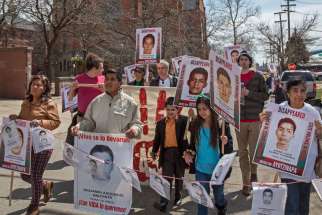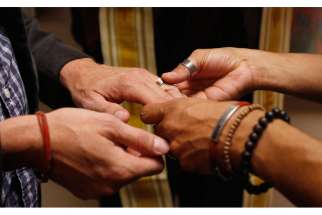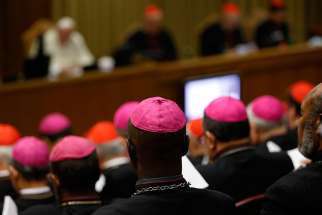OECTA preparing for job action when school starts
Ontario's Catholic teachers have signalled that they are ready to strike just before school is set to resume in September.
OTTAWA - A Mexican group that includes the mother of one of 43 students who disappeared from a teacher-training college in Ayotzinapa, Mexico, is asking Canada to take Mexico off its list of safe countries.
WASHINGTON - The questions raised by U.S. Supreme Court justices as they considered April 28 whether they should rule that same-sex marriage should be made legal nationwide covered a gamut of rights concerns — religious, equal protection, states' ability to enact their own laws.
Each family has its differences
When the U.S. Supreme Court declared it will rule in the coming weeks whether same-sex marriage will be extended nationwide, the esteemed New York Times and others called the issue “one of the great civil rights questions of the age.”
Divorcing ourselves from parents’ mistakes
It is difficult to imagine my parents no longer loving each other and living separately. It would be heartbreaking. At whose place would I choose to celebrate Christmas?
Family synod midterm report: Welcome gays, nonmarital unions
VATICAN CITY - In strikingly conciliatory language on situations contrary to Catholic teaching, an official midterm report from the Synod of Bishops on the family emphasized calls for greater acceptance and appreciation of divorced and remarried Catholics, cohabitating couples and homosexuals.
St. Michael's faculty reach contract deal
Theology professors and librarians at the University of St. Michael's College at the University of Toronto have a new deal.
After a 10-day break in negotiations, unionized faculty and St. Michael's administration finalized their first-ever labour contract in early October.
"What we ended up with is something that reflects the uniqueness of the University of St. Michael's College and upholds the best of what we have in our sector across Canada," said theology professor Michael Attridge, who participated in the 18 months of negotiations on behalf of 18 members of the faculty association.
The sticking point in negotiations had been how and when the college would declare programs and courses redundant. The union feared a system which would allow administration to unilaterally cancel programs and lay off faculty without regard to tenure. The administration proposal was a threat to academic freedom, Attridge said.
"Tenure and permanent status guarantees the integrity of academic freedom," he said.
Under the new agreement, faculty members will sit on committees that decide when budget realities at St. Michael's require that programs be trimmed. They will also sit on separate committees that decide which programs should be cancelled. Faculty will not have a majority vote on either committee.
"What we've put back in place is the collegiality of the governance of the institution," Attridge said. "Members of our association will participate in that decision making."
Theological faculty association members primarily deliver courses to graduate theology students of the Toronto School of Theology, a consortium of three Catholic and four Protestant theological schools at the University of Toronto. The St. Michael's faculty also teach a small number of undergraduate classes.
A statement e-mailed to The Catholic Register from the St. Michael's College administration called the agreement "a solid working document within which the parties can continue to conduct their collegial relationship."
The agreement covers three years from July 1, 2011 to June 30, 2014.
Union support of political causes is under the gun
The days may be numbered for union support of contentious political causes, something the Catholic Civil Rights League has been working towards for years.
While the league has been concerned about union support for same-sex marriage and other issues in opposition to Catholic teaching, the tipping point for political change may be the Public Service Alliance of Canada’s (PSAC) recent support for separatist candidates in the Sept. 4 Quebec election.
Conservative MP Pierre Poilievre, parliamentary secretary to the transport minister, promised to urge his cabinet colleagues bring in legislation that would allow employees to opt out of paying union dues.
“I cannot imagine how it could possibly be in the interests of a Canadian public servant for the union to back a separatist party,” Poilievre told the Globe and Mail. “And yet that is precisely what PSAC has done.”
The rights league became involved in the union dues issue back in 2004 when it fought for the rights of Catholic PSAC member Susan Comstock to have part of her $800 yearly mandatory dues diverted to charity because the union campaigned for same-sex marriage, contrary to her religious beliefs.
“We’ve always thought that, with good reason, union members should be able to put their request in writing so a portion of mandatory dues could be diverted to charity,” said league executive director Joanne McGarry. “The ability to opt out of the union is another possibility.”
At issue is “the ability of union members to have a say in how their money is spent so they don’t have to fund something they find morally repugnant,” she said.
Industry Canada employee Dave MacDonald, a former PSAC local president who represented Comstock in her grievance process, said the changes Poilievre proposes are “important because the PSAC, among others, have ceased to be an organization focused on improving workers’ rights and become a political organization.”
“As a Catholic, I am offended that my union dues are used to fund court challenges on abortion and same-sex marriage, gay pride parades and similar causes which have no correlation to the workplace,” he said. “Moreover, the Comstock case showed the extent to which the leadership in the PSAC was hostile to their own members who did not endorse their extreme political agenda.”
The Ontario English Catholic Teachers’ Association (OECTA) built a war chest for Premier Dalton McGuinty, despite religious freedom concerns raised by the Ontario bishops and Catholic school trustees about the Ontario government’s policies that would impose Gay-Straight Alliances on Catholic schools. McGarry said she encountered Catholic teachers who insisted OECTA did not represent their point of view.
“I’m sorry, but they do,” she said. “That’s your money; they do represent you.”
Legislation is not the only way to make change, she said. She urged union members to become involved in the running of their unions so they have a say on policies. But McGarry stressed the importance of religious freedom and conscientious objection.
“If someone’s in a position where union membership is a condition of employment, they should be able, for serious reasons, to divert their dues.”
MacDonald, who has a private immigration law practice outside his work for government, is concerned Poilievre’s proposals might end unions if everyone is able to opt out of paying dues altogether.
“I believe a good compromise, and one that I believe the Church agrees with, is to keep unions in line with the rights of charities (including churches) regarding political activities,” he said. “That is, they should be able to do some political activities providing they are related to the stated objectives of a labour union.”
Lobbying government on job security, wages, health and safety would be okay, as would communicating messages on these issues to members, he said.
MacDonald said reform would be welcomed by the vast majority of members because it would make “a union that was interested in protecting worker’s rights rather than espousing political viewpoints that are not shared by the majority of its members.”
Union leaders have reacted angrily against Poilievre’s proposal, with Canadian Labour Congress Leader Ken Georgetti accusing the Conservative government of trying to silence its critics.
Meanwhile, Conservative MP Russ Hiebert’s private member’s bill C-377 that would bring more accountability to how union dues are spent passed second reading last March and is now before the House of Commons finance committee.









